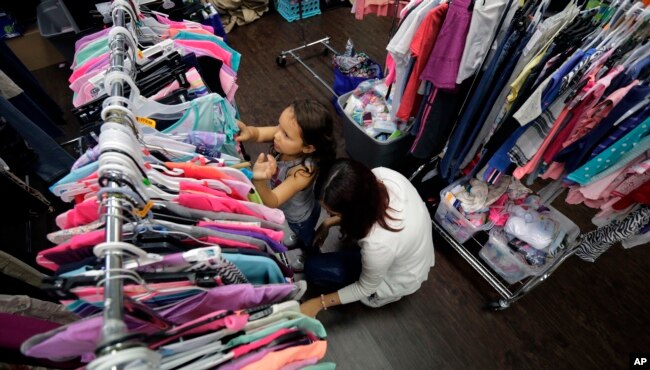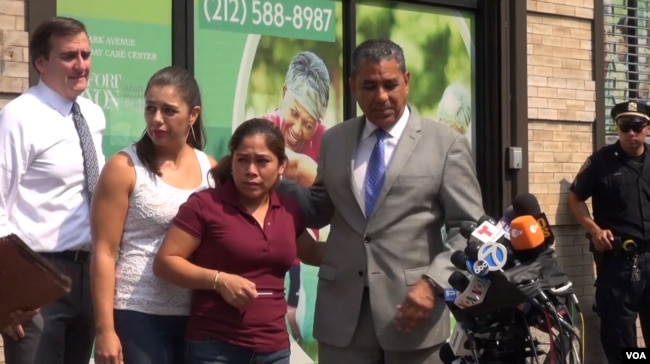
Family Separation Policy Galvanizes Americans
VOA News/Bill Rodgers
GETTYSBURG, PA — On a recent Thursday evening, residents of Gettysburg, Pennsylvania, brought bags filled with school supplies, toiletries, games and other items to be donated to a shelter in Baltimore, Maryland, that houses migrant children who have been separated from their families.
Galvanized by the Trump administration’s now-ended policy of separating detained migrant parents and children, dozens of residents of the historic town showed up with their donations and to attend a forum to learn more about immigration advocacy.
«It has hit a nerve with a lot of individuals in our neighborhood,» said Gettysburg resident Annette Ehly, referring to the administration’s «zero tolerance» policy. «All of a sudden, the lights have gone off, and they’re not very happy with the situation.»
Some 2,500 migrant children were separated from their parents when they crossed the U.S.-Mexico border illegally in May and June. Under a court order, the U.S. government has re-unified about 1,900 children — though hundreds more still remain in U.S. government shelters, many because their parents have already been deported.
Justice Department lawyers told a federal court judge Thursday that volunteers and nonprofit groups should take the lead in locating these deported parents, instead of government officials.They said the government will provide what information it has about these deported parents to these groups.
Polls show the administration’s separation policy has met with widespread disapproval. Indeed, Ivanka Trump, the president’s daughter and a White House adviser, said Thursday she was «vehemently against» separations of migrant children from their parents.
Surveys by CBS, Ipsos and others published in June and July show that up to 67 percent of Americans oppose separating families — a practice that was rescinded by the Trump administration in late June.
Results are more mixed among Republicans. The Ipsos/NPR poll found just over half of Republicans questioned supported the family separation policy.
While the family separation issue might seem to be a turning point in American public opinion about Trump administration immigration policy given the extensive opposition, Chris Jackson, vice president with Ipsos Public Affairs, does not see it that way.
«I don’t think it will have a lasting effect on American attitudes toward immigration. The separated families issue will just continue to have a sorting effect on Democrats and Republicans,» he told VOA. «It’s more about supporting Trump and won’t change how people feel about immigration.»
The scene of a pivotal Civil War battle, Gettysburg is also an island of blue Democrats in a rural county that voted overwhelmingly for Donald Trump in the 2016 presidential election, an election in which he turned Pennsylvania red for the first time in 24 years. Stopping illegal immigration and building a wall on the U.S.-Mexican border were top Trump campaign issues.
«Immigration has increasingly become a political wedge issue,» Jackson added. «If you look at it by parties, Democrats and Republicans have been increasingly separated over the issue over the past 10 years. It’s not new to Trump, he recognized it and took advantage of it.»
Attitudes toward immigration matter because it is likely to be a key issue in the upcoming mid-term elections in November.
Ironically, both Democrats and Republicans see it as a winning issue. Trump has made clear he plans to take the immigration issue on the campaign trail to fire up his supporters to vote for Republican candidates. Democrats are banking on polls showing huge majorities of their party faithful oppose building the border wall and other Trump administration immigration measures.
Motivated to take action
While the polls may not show a new nationwide attitude toward immigration, they do reflect the fervor on display in Gettysburg.
The donation drive and immigration forum was organized by a local activist group, Gettysburg Rising, the nonprofit Interfaith Center for Peace and Justice and the local YWCA. Attendance at these forums, several of which have been held since mid-June, has surpassed expectations.
«In each case, there’s been like a standing room only crowd,» said Donald Marritz, a Gettysburg resident and former Vietnam veteran. «So there’s definitely a strong local interest.»
«I remember being at the first one,» said Carey Ehly, husband of Annette. «I was just astounded that they ran out of chairs, they had to keep adding more chairs because the room was filled to capacity.»
Elsewhere, people across the country have been responding to fundraising efforts by established immigration groups such as the Refugee and Immigrant Center for Education and Legal Services, known as RAICES. The group has raised over $20 million in less than two months to pay for immigration court bonds and travel expenses for freed migrant parents to re-unite with their children.
Other groups have emerged online to raise money and organize volunteers to help detained migrant parents find their children. New York City-based Immigrant Families Together, formed in June by nine women almost all of them mothers, has raised over $400,000 in the past few weeks and posted bond for 12 migrant women so far.
The group was instrumental in re-uniting a Guatemalan mother with her children in mid-July, in a case that received widespread publicity. Yeni Gonzalez was being held at a detention facility in Arizona while her three children were sent to a shelter in New York City.
«We crowdfunded for Yeni’s bond and then she was released,» said Meghan Finn, one of IFT’s co-founders. «And I worked with a group of regular Americans to get her from Arizona to New York City where she was united with her children.»
Finn, a mother of two young children, said the overwhelming response for help in the Gonzalez case and others shows «…. this was such a visceral experience for many Americans, especially parents, that when they are given the opportunity to make even a very small change in someone’s life, they will answer the call, they will work together and put themselves out there.»
There are also smaller efforts. This weekend rural communities in several states plan to hold barbecues and picnics to show support for immigrants. A group of grandmothers set out from New York City Tuesday in a caravan, heading for the border to demand family reunification.




